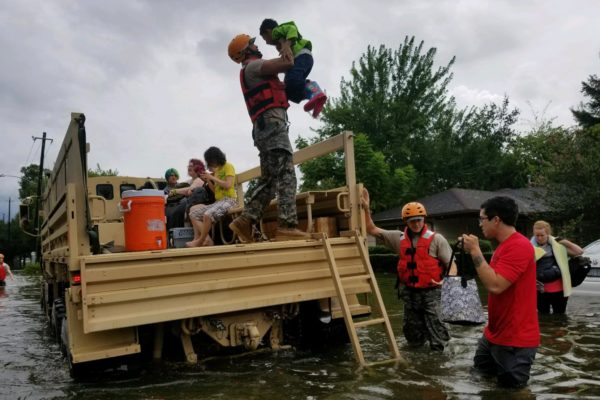AUSTIN, Texas — In the wake of Hurricane Harvey’s devastating floods across southeast Texas, Texans believe that government, the news media and insurance companies responded well, but they give especially high marks to neighbors and fellow Texans for responding to the crisis, according to the latest University of Texas/Texas Tribune poll.
The Category 4 hurricane began wreaking havoc Aug. 25, dropping nearly 5 feet of rainfall in some areas of southeast Texas and causing billions of dollars in damage. While the Texans polled were most impressed with their neighbors who rushed to help — 86 percent approved of the efforts put forth by “the people of Texas” — they also gave the responses of the federal, state and local governments relatively high marks. State and local government responses received positive approvals from 68 and 69 percent of Texans, respectively, followed by 57 percent approving of the federal government’s response.
“Not surprisingly, Texans had very positive responses to the way people both in the affected areas and from across the state rallied to help each other,” said James Henson, co-director of the poll and director of the Texas Politics Project at UT Austin. “They also gave high marks to all levels of government, though the state and local authorities got better reviews than the federal government.”
Voters in the state were sharply divided on whether climate change contributed to the severity of the hurricanes that inflicted damage on several states and the Caribbean: 45 percent agreed that climate change “contributed to the severity of recent hurricanes that impacted Texas, Louisiana, Florida and Puerto Rico,” while 42 percent disagreed. A large majority of Texas Democrats (80 percent) thought climate change was a factor in the storms’ severity, while nearly as large a percentage of Republicans (72 percent) thought climate change did not contribute to the storms’ force.
“While we didn’t see political partisanship exercising very powerful influence in Texans’ attitudes toward responses to Harvey’s effects, introducing the subject of climate change activated very strong partisan differences in attitudes,” Henson said.
The poll also asked Texans which relief efforts were most important for local, state and federal authorities to get involved in. Debris cleanup and housing ranked as the top two most important problems to address by 28 percent and 26 percent of the respondents, respectively. Public health was seen as the most important problem by 22 percent, and environmental contamination by 15 percent. Only 2 percent of those polled chose transportation or public education as a priority for the recovery effort.
“It was initially surprising that so few people thought fundamental issues like transportation and public education should be prioritized, given the attention that those two issues have received,” said Joshua Blank, poll manager for the Texas Politics Project. “But it makes sense, given the situation on the ground, that Texans are focused on the most immediate concerns, like housing, health and getting rid of tons of debris.”
The internet-based statewide poll was conducted Oct. 6-10 by the public opinion research firm YouGov. The overall sample included 1,200 self-declared registered voters. The poll has a margin of error of +/- 2.83 percentage points.
This is the latest in a series of polls conducted by UT Austin’s Texas Politics Project and The Texas Tribune. Comprehensive poll results and information about methodology will be released initially by The Texas Tribune during the next four business days. Graphics, a summary, crosstabs and a data file will be publicly available for research and teaching at the Texas Politics Project website next week.




